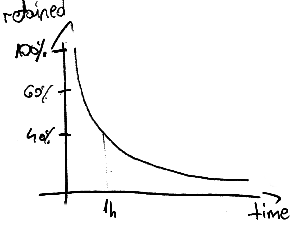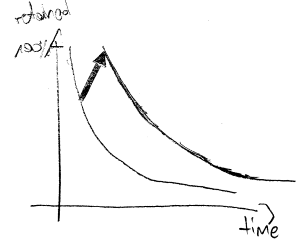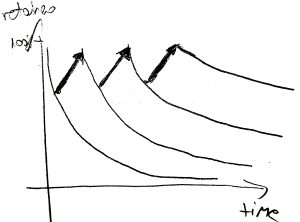Effective learning #
In the ever-changing IT ocean, you must keep swimming to stay in your current place. Frameworks change, practices develop, and paradigms shift - a good developer is a learning machine, no matter if they are working with machine learning or javascript.
I'd have to caveat that with few words on unchanging principles and that most of the things we are discussing as novelty have been done 40 years ago, but that's worth another post. But even if you optimize for the right knowledge and avoid trying to remember API details of a tool that will be gone in two years - there is still enough of both constant and constantly changing but essential topics that will last you a lifetime of learning.
And thus, one of the key issues I have with our education system, especially the academia (and as far as I can tell, this is not an isolated issue here), is that they absolutely fail to teach about softer aspects of technical roles - even effective learning.
Spaced repetition #
Spaced repetition is, as far as I could find, the best system we have for retaining knowledge. And one that's quite well researched. Long story short, if you are tested right after you start forgetting, the rate at which your memories decay will slow down. So from forgetting 60% of the content in 1 hour

You can go to

and

Finally managing to retain whatever nugget of wisdom you were trying to memorize.
The fact that you need to learn how to learn is a pretty Big Thing. We are what we remember - you can't be a mathematician without remembering the basic formulas. Now a trick question: do you remember all points of OWASP Top 10? Of software craftsmanship manifesto? Or even the Agile Manifesto? In contrast to what happened with manual multiplication and calculators, We can't outsource things that are supposed to drive our behavior.
I'm not going to waste mine or your time to scratch up a good introduction to spaced repetition, while a fantastic 20-minute starter like this already exists, and you can find further details on making great flash cards here.
However, let's explore today the issue of turning this theoretical approach into material results. And let's face it, consistent 10-30 minutes per day of intensive, inconvenient practice is an impossible plan for many, if not most people - me included.
Willpower #
I heard about spaced repetition and started using Anki years ago. I'm not going to lie - even though the promise of gaining a severe edge in the knowledge economy is alluring, I've been consistently failing to follow up on regular repetition (or even adding new cards to the set).
Willpower is a funny thing.
In the meantime, I tried multiple habit-building techniques or apps, from 'best in productivity', through notebooks, reminders, and wall-mounted scorecards, to social commitments.
Yes, it did have ~some~ results. No, I'm not happy with them.
Tiny habits #
A few months ago, I stumbled upon a Tiny habits program by BJ Fogg. The basic idea about Tiny Habits is that the behaviors you try to implement are:
- done at least once per day
- take < 30 seconds
- require little effort
And are triggered by your existing automatic actions (brushing teeth, setting an alarm clock, opening a fridge, etc.)
In short - habit-forming done right. There are many important details, including making the process fun and focusing on experimentation, but once again, there is no point in me taking the stage. Just sign up for a free 5-day course and let yourself be amazed.
Unexpected synergy #
Tiny Habits are currently my number 1 recommendation for making lasting life changes. However, making a habit of daily spaced repetitions is a whole another level of improvement. Hopefully, you will find this combination of a memorization technique with a habit-building system as useful as I and my significant other did!
For reference, I'm using Anki + Anki Droid , with most of the flashcards added on desktop and repetitions done on mobile each morning and evening.
If you are interested in soft skills topics, take a look on my previous post Overview of time management and in any case feel free to comment